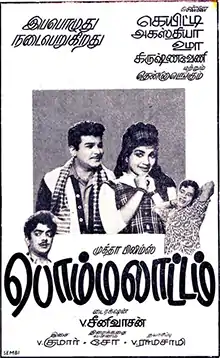Bommalattam (1968 film)
Bommalattam (transl. Puppet Show) is 1968 Indian Tamil-language comedy film, directed by Muktha Srinivasan and produced by V. Ramaswamy. The screenplay was written by Cho Ramaswamy from a story by Madurai Thirumaran. It stars Jaishankar, Jayalalithaa, Nagesh, Major Sundarrajan, Cho Ramaswamy and Manorama. V. S. Raghavan, Sachu and O. A. K. Thevar play key roles. The film was released on 31 May 1968.[2]
| Bommalattam | |
|---|---|
 Poster | |
| Directed by | Muktha Srinivasan |
| Screenplay by | Cho Ramaswamy |
| Story by | Madurai Thirumaran |
| Produced by | V. Ramaswamy |
| Starring | Jaishankar Jayalalithaa |
| Cinematography | T. M. Sundarababu B. A. |
| Edited by | L. Balu |
| Music by | V. Kumar |
Production company | Muktha Films |
Release date |
|
Running time | 165 minutes[1] |
| Country | India |
| Language | Tamil |
Plot
Cast
- Jaishankar as Sukumar[3]
- Jayalalithaa as Malathi[3]
- Nagesh as Durai
- Manorama as Chinna Ponnu[3]
- Cho Ramaswamy as Jaambazaar Jaggu[3]
- Sachu as Geetha
- Vennira Aadai Moorthy as Sukumar's father
- Major Sundarrajan as Rathnam/Bal Raj
- V. S. Raghavan as Dr. Dhamodharan
- O. A. K. Thevar as Chithambaram
- K. K. Soundar as Rathnam's henchman
Soundtrack
Music was composed by V. Kumar and lyrics were written by Vaali, Alangudi Somu, Na. Pandurangan and Avinasi Mani.[4] For the song "Vaa Vathiyare", Srinivasan wanted the usage of Madras Bashai, but Vaali felt it was hard for him, so M. L. Govind was hired to "provide the apt words to go with it", leading to the birth of lines in the song like "Jambaar Jakku, Na Saidapetta Kokku".[5] That also became Tamil cinema's first gaana song.[6] "Vaa Vathiyare", sung by Manorama became popular, and in 1991 HMV released a compilation album under the same title, featuring songs sung by Manorama.[7]
| Song | Singer(s) | Length |
|---|---|---|
| "Mayakkathai" | P. Susheela | 3:55 |
| "Nee Aada Aada Azhagu" | T. M. Soundararajan | 3:20 |
| "Nalla Naal Parkkavo" | T. M. Soundararajan, P. Susheela | 4:11 |
| "Va Vathyare" (Jambajar Jakku) | Manorama | 3:51 |
| "Poonai Kannai Kattinal" | Tharapuram Sundararajan & S. Sarala | 3:10 |
Reception
Kalki appreciated the animated opening titles, but criticised the film's title for lacking relevance to the story.[8]
References
- Cowie, Peter, ed. (1968). World Filmography. Tantivy Press. p. 266. ISBN 978-0-904208-36-8. Retrieved 11 July 2022.
- "ஜெயலலிதா நடித்த திரைப்படங்களின் பட்டியல்". Dinamani (in Tamil). 6 December 2016. Archived from the original on 24 June 2020. Retrieved 11 July 2022.
- Narayanan, Sujatha (7 December 2016). "Timeless...cho". The New Indian Express. Archived from the original on 21 September 2021. Retrieved 14 July 2022.
- "Bommalaattam". Gaana. Archived from the original on 12 May 2015. Retrieved 18 September 2021.
- Ramanujam, Srinivasa (28 August 2016). "The vathyaar dialect". The Hindu. Archived from the original on 31 October 2017. Retrieved 31 October 2017.
- Vijayakumar, Sindhu (15 May 2017). "Gana is the voice and language of people who are outcasts". The Times of India. Archived from the original on 25 February 2018. Retrieved 20 May 2019.
- Pradeep, K. (30 June 2008). "50 years of Manorama". The Hindu. Archived from the original on 25 July 2020. Retrieved 8 August 2021.
- "பொம்மலாட்டம்". Kalki (in Tamil). 23 June 1968. p. 41. Archived from the original on 25 July 2022. Retrieved 14 March 2022.
External links
- Bommalattam at IMDb